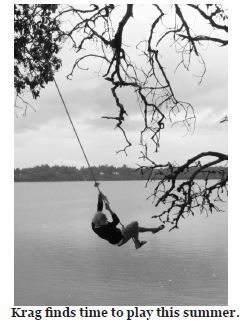President's Messageby Krag Unsoeld Stepping back into the shoes of being president of SPEECH, I realize it has been a decade since I last held this position. I will attempt to carry on some small semblance of the wonderful job that Janine Unsoeld has done as president for the past six years.
Reminiscences Arriving in Olympia, I helped establish the Olympia Youth Coalition which pioneered Thurston County's first bottle and can recycling program, with drop-offs at five local supermarkets. My mother, Jolene, and Bernice Youtz drove their cars to empty the 55 gallon drums we had put out to collect the bottles and cans. Now the cities and the county both conduct curbside pickups. The early '70s were also a time when Washingtonians were becoming aware of the threats posed on their shorelines. One project that was of special concern was the deep water export terminal that Weyerhaeuser wanted to build adjacent to the Nisqually Delta. In 1970, over a 10-week period, an environmental coalition gathered the second highest number of signatures on an initiative that had been obtained at that time. This citizen's initiative did not succeed but the legislature did pass the Shoreline Management Act. Ultimately, the Nisqually export facility was stopped--the Nisqually Delta Association helped the delta to become a National Wildlife Refuge.
Fast Forward One of the reasons for the 1911 Public Ports Act was a Progressive-era backlash against the stranglehold that the railroads had on waterfront operations. It was thought that public ports could help ensure industry and exports that would benefit the general population. However, ports are a hybrid organization that combines the taxing, bonding and other aspects of government, with an entrepreneurial, commercially driven enterprise. Put on top of these characteristics the strength of the longshore unions and you see that ports are big government, big business and big labor all rolled up in one.
SPEECH Needs You, I would like to quote Marge Piercy, from a portion of her poem, "To Be of Use."
Greek amphoras for wine or oil, So if you want to do work that is real, please consider volunteering with SPEECH. We can always use writers, editors, photographers, distributors and board members! We look forward to hearing from you. Krag Unsoeld is President of SPEECH and can be reached at kragu@juno.com or (360) 250-9982.
Back to Home page. |

